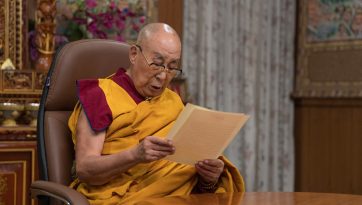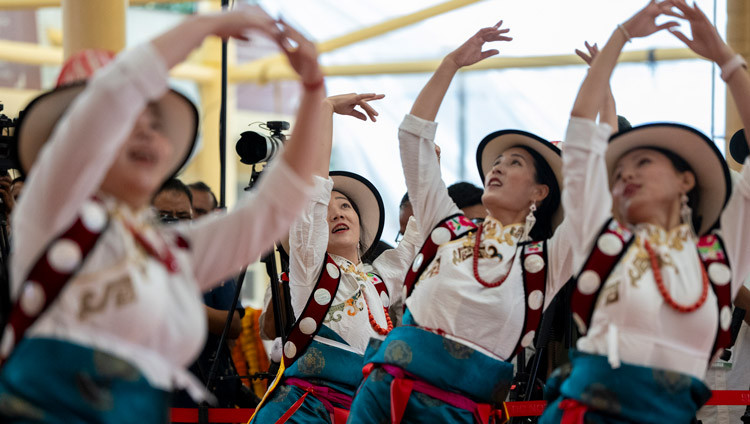The Heart Sutra – Third Day
January 7, 2021
Thekchen Chöling, Dharamsala, HP, India – As soon as he entered the room from where he teaches online this morning, His Holiness the Dalai Lama scanned the faces on the screens in front of him, smiled and waved before he sat down. After Ven JinOk had bowed in greeting and chanted the ‘Heart Sutra’ in Korean, His Holiness resumed his teaching.
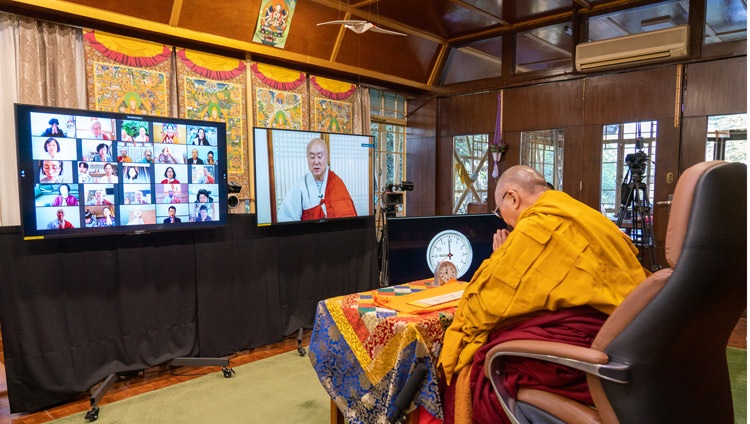
“Today is the third day of these teachings. Have you been able to reflect on what we’ve discussed? When you receive explanations from your teacher, don’t leave it at that, go over it again and again in your mind. Reflect on it so that you become convinced of what you’ve heard. The point is to effect a transformation in your mind. Reflect on what you hear; read books.
“I’ve received teachings on the stages of the path since I was a child, but if I hadn’t thought them over, they’d have had little impact on me. By thinking through what I’ve heard, and comparing one teaching with another, my understanding has grown.
“These days, as soon as I wake up, I recite a verse to myself aspiring to attain enlightenment. I reflect on verses by Nagarjuna relating to emptiness and think through the four logical absurdities Chandrakirti mentions would ensue if things were to have objective existence. I also mull over a verse from Nagarjuna’s ‘Fundamental Wisdom of the Middle Way’:
Neither one with the aggregates, nor different from them,
The aggregates are not (dependent) on him, nor is he (dependent) on the aggregates.
The Tathagata does not possess the aggregates.
What else is the Tathagata?
“It’s by reflecting on instructions like these that we can develop conviction in and experience of the teachings.
“Ornament for Clear Realization’ tells us that the teachings of the Buddha are of three types: words that came from his mouth, words that were blessed by the Buddha and words permitted by him. Although the bulk of the sutra may be classified as words permitted by the Buddha, when he responds to the conversation between Avalokiteshvara and Shariputra saying, ‘“Excellent, excellent, Son of the noble lineage, it is that way. It is that way. As you have taught, the profound perfection of wisdom is to be practised. The Tathagatas too rejoice”, these words of appreciation are spoken by him.
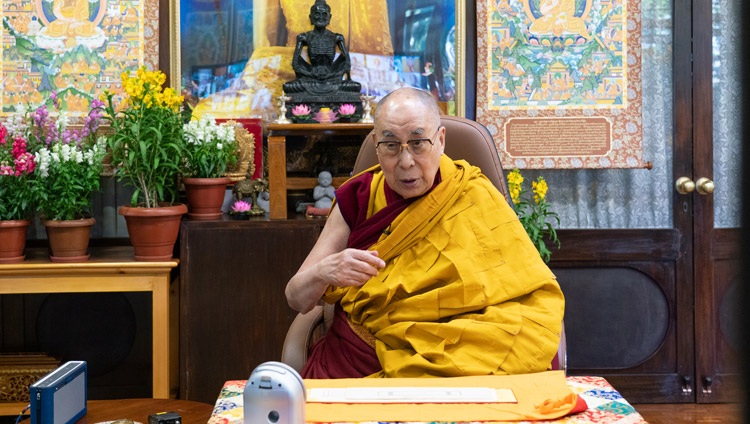
“During the first round of his teachings, the Buddha explained the four noble truths three times, in terms of their nature, functionality and result. When he explained their nature, he declared that suffering is to be known, the origin is to be eliminated, and cessation is to be actualized by cultivating the path. He didn’t go into selflessness in great detail.
“In the second round of his teachings, when he explained the perfection of wisdom, he clearly showed that things do not exist inherently. You can see this, for example, in the Perfection of Wisdom Sutra in 8000 lines.
“The Sutras can be quite repetitive, but Nagarjuna summarizes what they say in his six collections of reasoning, especially the ‘Fundamental Wisdom of the Middle Way’, and Chandrakirti elaborates on that. We also rely on the works of Dignaga and Dharmakirti that deal with reason and logic and I commend them to you Koreans too. They provide the tools that enable us to prove the truth of the teaching.
“Aryadeva also sheds light on how our exaggerated outlook prompts us to create all sorts of problems.
As the tactile sense [pervades] the body
Ignorance is present in all [afflictive emotions].
By overcoming ignorance, you will also
Overcome all afflictive emotions.
“And although there are specific ways to counter anger and attachment, we can overcome ignorance by coming to understand emptiness and dependent arising and so root out all afflictive emotions. Nothing exists as it appears to us; things only exist by way of designation. When we can combine an understanding of emptiness with the awakening mind, we’ll make progress on the path. This concludes our reading of the ‘Heart of the Perfection of Wisdom.”
Because several interested people had requested it, His Holiness next gave the transmission of a Guru Yoga of Avalokiteshvara entitled a Stairway to Potala, which he composed in Tibet.
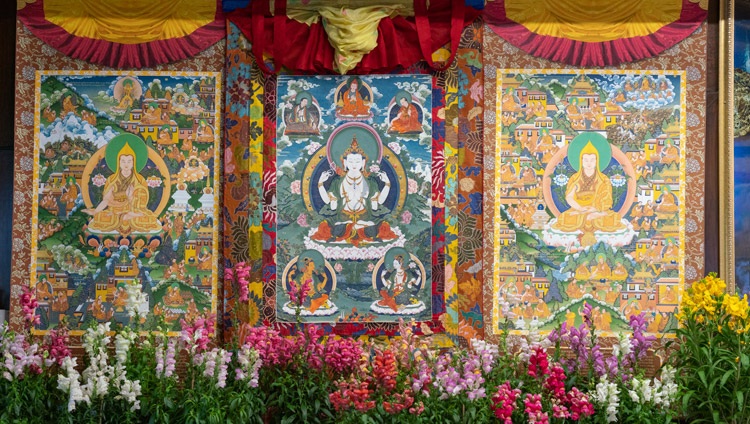
His Holiness once again emphasized the need to combine the practice of bodhichitta with an understanding of emptiness. He conceded that he also does Yidam practice, but the main transformation of his mind has come about through cultivating bodhichitta. He noted that in tantra you visualize deities arising out of emptiness. He also remarked that the special feature of meditation on Vajrabhairava is in its combining peaceful and wrathful practice.
In preparation for the ceremony for cultivating bodhichitta, His Holiness encouraged his listeners to visualize Buddha Shakyamuni in the space before them surrounded by the eight close disciples, Maitreya, Samantabhadra, Avalokiteshvara, Manjushri and so on. They in turn are encircled by the seventeen masters of Nalanda.
He stressed the importance of cultivating a good heart, of aspiring to help and serve all other beings. Having found this precious human life, we should be determined to make it meaningful. He briefly read through the three verses to be repeated during the ceremony.
I seek refuge in the Three Jewels;
Each and every wrongdoing I confess.
I rejoice in the virtues of all beings.
I take to heart the state of Buddhahood.
I go for refuge until I am enlightened
To the Buddha, the Dharma, and the Supreme Assembly,
In order to fulfil the aims of myself and others
I develop the awakening mind.
Having developed the aspiration for highest enlightenment,
I invite all sentient beings as my guests,
I shall enact the delightful supreme enlightening practices.
May I become a Buddha to benefit all sentient beings.
Following the third repetition, he recited a verse of celebration and rejoicing from Shantideva’s ‘Entering into the Way of a Bodhisattva’.
Today, my birth is fruitful. My human life is justified. Today, I am born into the family of the Buddha. Now I am a child of the Buddha. 3/25
When it was suggested to him that technology such as mobile phones might intrude on a Buddhist spiritual practice, His Holiness conceded that if such practice was only about sitting quietly that might be true. However, the main practice, is to develop an aspiration to enlightenment and to help other beings. In this connection, a mobile phone, as a means of communication, can be useful.
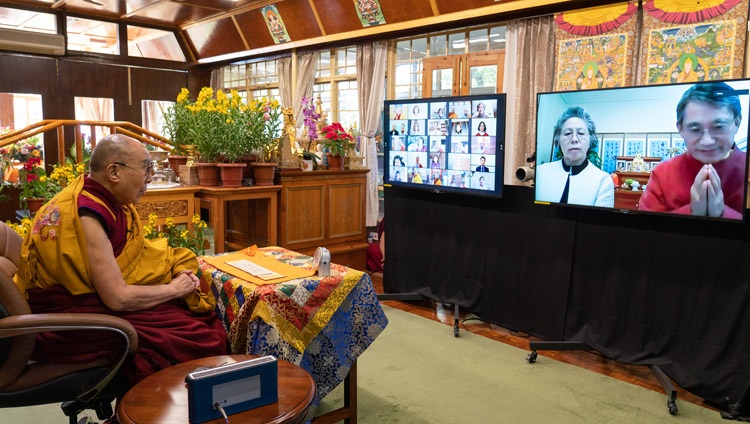
Asked how to develop patience, His Holiness affirmed that it doesn’t arise spontaneously. You have to make an effort and familiarize yourself with it. What’s more, it’s those hostile to us rather than our friends who teach us patience. Shantideva makes this clear in chapter six of his ‘Entering into the Way of the Bodhisattva’ and in chapter eight that deals with altruism. He mentioned that Chandrakirti’s ‘Entering into the Middle Way’ also discusses the virtues of patience.
With regard to coping with the emotional hardships that the covid pandemic has entailed, His Holiness said he was aware of the apprehension and anxiety experienced by many people in different parts of the world. He suggested that from a broader perspective our bodies are of the nature of suffering. We are naturally subject to sickness and death. What people are experiencing now can be seen as the result of past karma. On the one hand, if we have not created the karma, we will not encounter its fruit, but on the other, if the causes and conditions have been brought about, it’s difficult to avoid their result.
He suggested that being apprehensive and anxious doesn’t improve our health. He recalled Shantideva’s advice that if there is a remedy to a problem, there’s no need to worry about it. And if there is no remedy, worrying won’t help.
A Korean mother working in London wanted to know how to treat all children equally without focussing only on her own. His Holiness told her that followers of theistic traditions like Christianity say we are all children of one god, which makes us all equal. From a Buddhist perspective, it’s helpful to view all sentient beings as being near and dear to us like members of our own family. It’s useful to take a reasoned approach and reflect on the advantages of cherishing others.
Ven JinOk thanked His Holiness for his advice during these hard times. He told him that many people in Korea had been touched by what His Holiness had to say. He expressed appreciation at being able to see and listen to His Holiness online and voiced the hope that the opportunity may be repeated in the future. He prayed that His Holiness stay well.
In reply His Holiness said, “We’ve known each other a long time. At the moment, because of the pandemic, we cannot meet in person, but meeting together online can help us fulfil the purpose of our lives, which is to achieve inner transformation. I’m sure there will be opportunities to do this again in the future. In the meantime, be happy. Thank you.”

